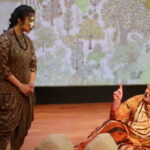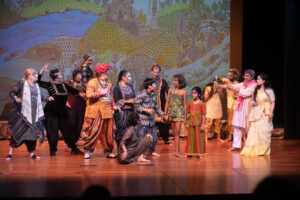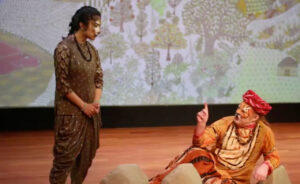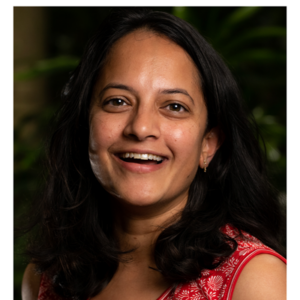
This Fall EnActe Arts is opening its most ambitious production to date – THE JUNGLE BOOK:RUDYARD REVISED
When Indiaspora member Vinita Belani founded Enacte Arts in 2013 to bring Jean-Claude Carriere’s legendary re-telling of the Mahabharata to American audiences, she established a fundamental principle that has guided the theater company ever since: reimagine the canon of South Asian stories in a universal context. Now, with thirty seven diverse productions and a global pandemic behind it, EnActe is about to reimagine one of the world’s best-loved stories: Rudyard Kipling’s The Jungle Book.
Kipling’s classic is ostensibly about an adorable kid, an evil tiger, and a heartbreaking choice to belong to one, and only one world: either the jungle or the village. The Jungle Book is thought of as a tale with all the dramatic elements of good versus evil. But does it have to be? Is the tiger evil or just misunderstood? Is there a way for Mowgli to be a resident of both the jungle and the village? What would a jungle-village coexistence look like?”
EnActe took this question to the 2020 cohort of their EnActe Conservatory – an established, one year program for advanced theatre makers of all ages. At the height of the pandemic, fourteen writers aged 6 to 66 spent three months in a Writer’s Room on Zoom. They pored over the original writings of Kipling against a backdrop of the Black Lives Matter movement, tiger extinction concerns, raging wildfires decimating forest land and debates on BIPOC representation in the arts. They re-examined the work through a contemporary lens of coexistence and tolerance, belonging and identity, and animal conservation and rights. The result is The Jungle Book: Rudyard Revised, reclaimed, reimagined, and rewritten for our times.
Vijay Rajan, filmmaker and then Head of Education at EnActe, says, “the most problematic thing with the original Jungle Book is that it espouses the notion that people belong with their own kind. That was the ultimate message we wanted to eliminate.” This belief in multicultural coexistence — perhaps shaped by the fact that many of the writers in the Enacte collective are immigrants for whom this is a lived experience — pervades and animates the revised play.
It is not just that Kipling was no champion of such harmony. Since the height of his popularity, he has been called (credibly, many would say) a racist and an imperialist warmonger.
In a bold and generous turn of innovation — which Kipling, the traditionalist, would perhaps have disapproved of — the play casts the great author himself as a character. It recreates him as a storyteller of our times. This forces the audience to ask themselves how much of his vastly complicated views were his own and how much were they a product of his time.
The Jungle Book:Rudyard Revised extends such generosity not just to the author but to one of the most villainous characters in literature and Disneydom: the evil tiger Shere Khan. Now thoughtfully named Sher Baagh, he is portrayed with a nuance and sympathy absent from the original. Karsten Freeman, who plays the tiger, says, “The tiger is in a lot of pain because he’s the only one left.” It is a simple point. But it hits hard. In a world where the majestic creatures are nearing extinction, it is powerful and moving.
This makes it the perfect vehicle for showcasing the work of and fundraising for the Centre for Wildlife Studies, headed by frequent Indiaspora speaker Dr Krithi Karanth, who will be traveling with the show and speaking about tiger conservation and the uphill task of bringing the tiger back from the brink of extinction.
As the play swings between the jungle and the village, between animals and humans, it reflects another core principle at EnActe: that music and dance are inseparable from plays, a belief that traces its roots to the ancient Sanskrit treatise on the performing arts, The Natya Shastra.
In line with the theater company’s embrace of Eastern and Western traditions of storytelling, the lush music in Rudyard Revised is composed by acclaimed saxophonist George Brooks. Brooks is renowned for blending two of the great improvisatory traditions in world music: jazz and Indian classical music. He says that he “looked to Raaga, the modal approach to Indian melody, to set up the sonic environment of the play.” For the rhythmic pieces that he composed for the jungle scenes, it must have helped that he has visited India many times and “walked the jungles with the monkeys chattering at me.”
The music is brought to vibrant life by choreographers Aparna Sindhoor and Anil Natyaveda, of the Navarasa Dance Theater. Like Brooks, they blend different traditions to juxtapose and move between the village and the jungle. Aparna is an exponent of the classical Indian dance Bharatanatyam, appropriate for the human scenes. Anil is an exponent of Kalaripayattu, the ancient Indian martial art that suitably incorporates graceful animal movements, and both have choreographed for great American shows like the Cirque du Soleil.
Vinita, the Artistic Director insists that every EnActe play must break ground in some way. The Jungle Book: Rudyard Revised brings together traditional and postmodern ways of storytelling, the great traditions of South Asian and American music, and movements inspired by classical dance and martial arts. It does so while keeping all of Kipling’s fascinating characters and riveting storyline, yet making the rich texture feel more authentic. It succeeds in amplifying South Asian voices. More impressively, with this play, the theater company continues to realize another of its key guiding principles: “to celebrate the past, be mindful of the present, and give voice to the future.”
Even Rudyard Kipling, that arch-conservative, would have approved!
The Jungle Book:Rudyard Revised is starting the first leg of its National Tour in the Bay Area and Houston. Show dates –
Palo Alto – Sept 30th – Oct 2nd, Houston – Oct 8th, 9th, San Francisco Nov 11th -20th, San Jose Dec 2nd – Dec 11th.
Original article @ https://indiaspora.org/the-jungle-book-rudyard-revised/








No comment yet, add your voice below!